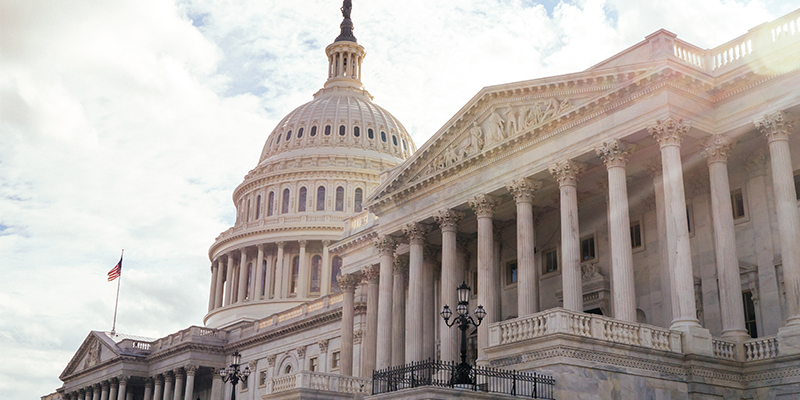While NAIOP has a wide-ranging government affairs agenda, the two hottest areas of focus right now are the bipartisan infrastructure deal, which accounts for $1 trillion in “physical infrastructure,” and the budget reconciliation bill, which allocates $3.5 trillion toward “human infrastructure.”
At NAIOP’s I.CON West last week in Long Beach, California, NAIOP Senior Vice President for Government Affairs Aquiles Suarez provided an in-depth overview of the latest developments related to these pieces of legislation and what they mean for the commercial real estate industry.
In early August, the Senate passed the Infrastructure and Jobs Act, which provides for $1 trillion in physical infrastructure funding with $550 billion in new funding over a five-year period.
While neither party was entirely pleased with the final bill, the legislation provides significant investments, including $110 billion for roads and bridges; $66 billion for passenger rail; $17 billion for ports; and $39 billion for public transit. It also includes $88 billion to strengthen and modernize the power grid and increase the U.S. market share of plug-in electric vehicle sales.
The Infrastructure and Jobs Act included several positive developments from NAIOP’s perspective. The industry gained increased support for public-private partnerships (P3s), with the legislation having raised the caps on private activity bonds for surface transportation projects. In addition, $250 million was allocated to support energy audits and retrofits for commercial and residential buildings. Finally, the bill encourages streamlined permitting for major federally funded infrastructure projects, which must undergo complicated and oftentimes lengthy reviews and obtain approvals from various departments and agencies. It enshrines a two-year time limit as the goal for agencies to conclude their reviews – a goal that had only existed in executive orders.
The Senate and House recently passed a $3.5 trillion budget resolution, opening the way for the development of a reconciliation bill that would not be subject to a Senate filibuster.
The budget resolution states that Congress can add $1.75 trillion to the national deficit and raise taxes for the remaining half. However, House Speaker Nancy Pelosi (D-CA) and Ways & Means Committee Chair Richie Neal (D-MA) want the full amount of the reconciliation package to be paid through increased taxes on higher income earners and businesses.
Those proposals include:
- Increase in top capital gains rate to ordinary income rate for higher income taxpayers from 20% to 39.6%.
- Limit of like-kind exchanges to under $500,000.
- Elimination of capital gains treatment for carried interests.
- Elimination of “step-up” in basis for estate assets.
Here is NAIOP’s position:
Capital Gains: Maintaining a meaningful differential between capital gains and ordinary income rates for commercial real estate investment is critical for the success of the industry. In the past, Congress has repeatedly recognized the need for lower capital gains tax rates so as to providing the incentives investors require to undertake the added risk inherent in long-term real estate development.
Like-kind Exchanges: 10-20% of all real estate transactions involve a like-kind exchange, so it is a deeply ingrained feature of modern commercial real estate markets. The repeal of like-kind exchanges would immediately lower property values and increase rental costs to offset additional tax burdens.
Carried Interest: Carried interests, also known as “promotes”, have been mischaracterized as only important to Wall Street hedge funds. In fact, it is an integral part of many real estate development projects. Eliminating capital gains tax treatment for carried interests in real estate partnerships would undermine entrepreneurial activity in the real estate sector.
Stepped-up Basis: The Biden administration has proposed ending the use of “stepped-up” basis for estates and making the resulting higher capital gains taxes on such estate properties immediately payable on the death of the owner. Under current law, the cost of a property for tax purposes is determined to be the free market value at the time the owner dies and the property becomes part of his or her estate. Eliminating the “step up” and using the original purchase price of the property could result in an enormous tax increase, depending how long the property had been owned by the decedent. This would result in extensive disruption to commercial real estate markets.
September will be a critical month for both the infrastructure bill and the larger budget reconciliation measure. The leadership of the House has committed to a vote on the bipartisan infrastructure bill on Sept. 27. Prior to that, committees will be holding markups for their sections of the budget reconciliation measure, with the goal of having the comprehensive bill ready by that time.
This post is brought to you by JLL, the social media and conference blog sponsor of NAIOP’s I.CON West 2021. Learn more about JLL at www.us.jll.com or www.jll.ca.









